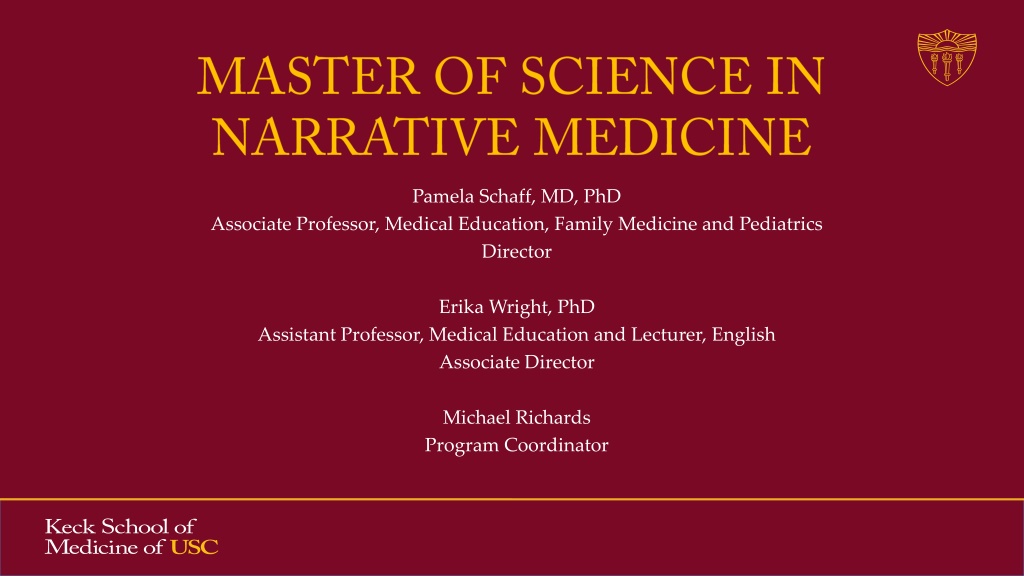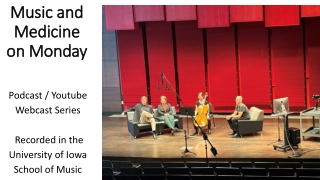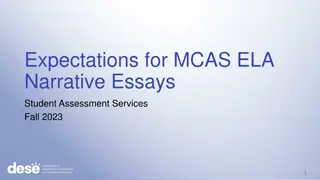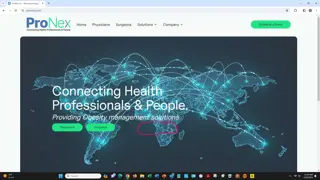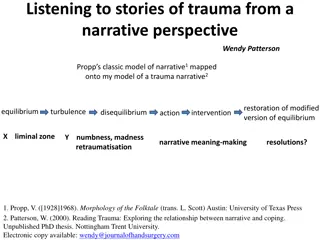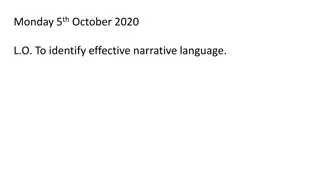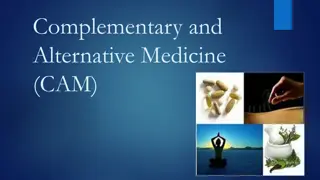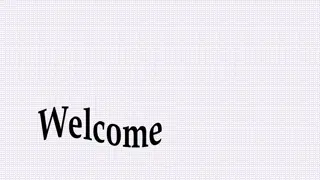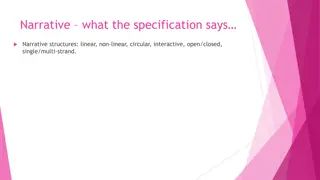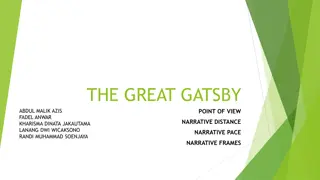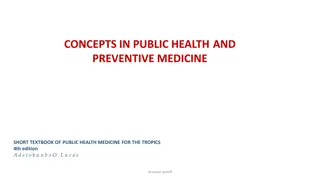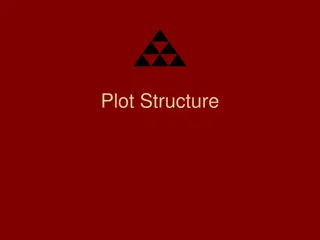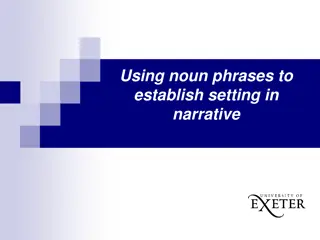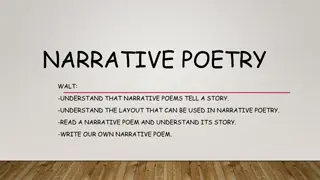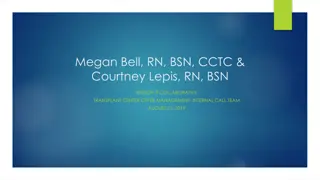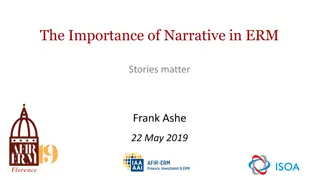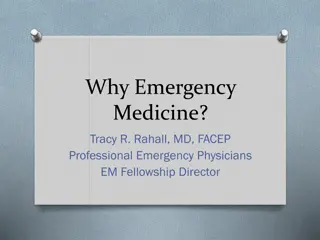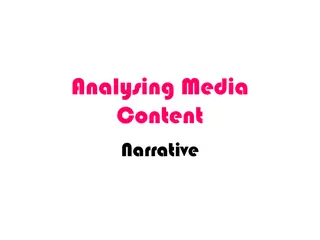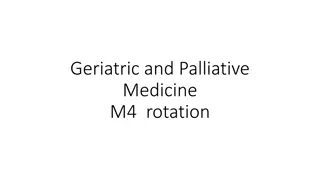Narrative Medicine at Keck School of Medicine
Uncover the realm of Narrative Medicine through an insightful overview of the Master of Science program at Keck School of Medicine. Delve into the interdisciplinary nature of this field, its practical applications in healthcare, and the opportunities it offers for addressing social justice in medical care. Learn about the admission requirements and the potential career paths for graduates in this innovative program.
Download Presentation

Please find below an Image/Link to download the presentation.
The content on the website is provided AS IS for your information and personal use only. It may not be sold, licensed, or shared on other websites without obtaining consent from the author.If you encounter any issues during the download, it is possible that the publisher has removed the file from their server.
You are allowed to download the files provided on this website for personal or commercial use, subject to the condition that they are used lawfully. All files are the property of their respective owners.
The content on the website is provided AS IS for your information and personal use only. It may not be sold, licensed, or shared on other websites without obtaining consent from the author.
E N D
Presentation Transcript
Pamela Schaff, MD, PhD Associate Professor, Medical Education, Family Medicine and Pediatrics Director Erika Wright, PhD Assistant Professor, Medical Education and Lecturer, English Associate Director Michael Richards Program Coordinator
SESSION GOALS Introduce Narrative Medicine Provide an overview of the new Master of Science in Narrative Medicine at Keck School of Medicine Explain application process and admissions requirements (General and Progressive Degree Program) Share career opportunities available to graduates of MS in Narrative Medicine program Outline Narrative Medicine courses and introduce faculty
What is Narrative Medicine? [T]he phrase narrative medicine [coined in 2000]. . . refer[s] to clinical practice fortified by narrative competence the capacity to recognize, absorb, metabolize, interpret, and be moved by stories of illness. Simply, it is medicine practiced by someone who knows what to do with stories. Rita Charon, What To Do With Stories: The Sciences of Narrative Medicine (2007)
An Interdisciplinary Field of Study Narrative Medicine uses the tools from other disciplines (literary studies, creative writing, philosophy, anthropology, and sociology) as a means of strengthening and reshaping the ways institutions and individuals understand the relationship between clinical medicine, public health, and social justice.
WHY NARRATIVE MEDICINE? Students will have a unique opportunity to teach and learn from community partners about the relationship between health and narrative Students will be able to offer solutions that recognize the intersection between biomedical, behavioral, and health system science and address issues of health care equity and social justice
ADMISSION REQUIREMENTS A bachelor s degree or its equivalent from an accredited institution at the time of matriculation A minimum cumulative undergraduate grade point average of 3.2 (A = 4.0)
APPLICATION General 1) Online application 2) Written statement of your personal aims and interests in the program in Narrative Medicine (750 words maximum) 3) Evidence of promise in the field of narrative medicine. You may fill this requirement by submitting a writing sample in one of the following categories:
Evidence of PromiseWriting Sample A work you have written (published or unpublished) that pertains in some way to narrative medicine, health humanities, arts and medicine, or related fields. This may be fiction, non-fiction, or poetry (Ex. a first-person essay or memoir, or an interpretive essay/analysis of a work of art or literature) A scholarly paper (published or unpublished), article, or book related to your profession that you have authored A syllabus for a course you have taught in narrative medicine or a related field, including an essay of no more than 1000 words describing and critiquing the course A portfolio of art, a film you have made, or images of a performance piece, with accompanying explanatory essay of no more than 1000 words
4) Three letters of recommendation (at least two from college professors who can speak to your preparedness for graduate study); applicants who received their bachelor s degree more than 5 years prior to the date of application are strongly encouraged to submit an academic letter of reference. Professional references will be considered in place of academic letters 5) Official transcripts from all previously attended post-secondary institution 6) For international applicants, TOEFL/IELTS proficiency in English language is required NOTE: GRE is not required
APPLICATION Progressive Degree Pathway Current USC juniors and seniors with a 3.2 + GPA may apply 1) Consult Progressive Degree Program guidelines available on their website: https://undergrad.usc.edu/programs/progressive/ 2) Contact your undergraduate advisor to initiate the PDP application 3) Consult a Narrative Medicine graduate advisor to complete the graduate portion of the proposed course plan
4) Submit TWO supplemental materials to the Narrative Medicine Program: Written statement by the applicant of their personal aims and interests in the program in Narrative Medicine (750 words maximum). AND Evidence of promise in the field of narrative medicine. Submit ONE of the following: A work written by the applicant that pertains in some way to narrative medicine, health humanities, arts and medicine, or related fields. This may be fiction, non-fiction, or poetry (Ex. a first-person essay or memoir, or an interpretive essay/analysis of a work of art or literature) OR A portfolio of art, a film the applicant has made, or images of a performance piece, with accompanying explanatory essay of no more than 1000 words 5) When your application is complete, send all materials as a PDF with LAST NAME_FIRST NAME to uscnarrativemedicine@usc.edu
FINANCIAL AID To learn about ways to finance your graduate education and types of aid available to graduate students, please visit USC Financial Aid Office website at https://financialaid.usc.edu/
CAREER OPPORTUNITIES Training acquired in this program will enhance the work of future health care professionals Individuals pursuing careers in journalism, film, nonprofit sector, humanitarian leadership, social justice and community organizing, including those looking to apply to PhD programs in the humanities, will develop a variety of tools for creating boundary-crossing initiatives that address real-world problems in community healthcare
PROGRAM DETAILS The Master of Science in Narrative program is a one-year (on campus) program A minimum of 32 units of graduate-level course work is required: Core courses (22 units) Capstone (2 units) Elective/Directed Research (8 units)
FACULTY Pamela Schaff, MD, PhD (Medical Education, Family Medicine, and Pediatrics) Director, HEAL Erika Wright, PhD (Medical Education and English) Associate Director, HEAL Cheryl Mattingly, PhD (Anthropology) Ronan Hallowell, EdD (Medical Education) Kairos Llobrera, PhD (Medical Education) Lyn Boyd-Judson, PhD (Co-Chair, Oxford Initiative for Global Ethics & Human Rights; Director, Global Women s Narratives Project) Abigail Rasminsky, MFA (Medical Education)
Course of Study Core Narrative Medicine I: Witnessing, Listening, Reflecting (4 units) Introduction to Narrative Medicine and history of health humanities; examine theories of narrative, trauma, witnessing, identity as related to health care and the clinical encounter Narrative Medicine II: Methods and Pedagogy (6 units) Advanced study in Narrative Medicine; study current methods and best practices for designing and evaluating narrative medicine workshops; includes teacher training, practicum, and advisement Creative Writing and its Applications in Narrative Medicine (4 units) Introduction to creative writing in the clinical setting; study nonfiction/journalism, memoir, fiction, and poetry; work toward creative project that incorporates narrative medicine methods
Course of StudyCore, contd. Research Methods in Narrative Medicine (4 units) Explore philosophical underpinnings of qualitative research, its use in health research; develop specific methodologies for data collection and assessment in Narrative Medicine Intersubjectivity: Lived Bodies/Relational Selves (4 units) Introduction to philosophical, anthropological and sociological considerations of intersubjectivity and experience; narrative approaches to intersubjectivity and relational self-making focusing especially on clinical encounters
Course of Study, electives and summative experience Narrative Ethics: Illness, Disability, Equity, and Community (4 units) Examine the relationship between illness and disability narratives and their familial, social, and institutional contexts; develop skills in interviewing, close reading, and writing toward publication Immigrants, Illness and Narrative Medicine (4 units) Apply narrative medicine methods to the study of fictional and non-fictional illness narratives from the immigrant perspective in the United States Directed Research (1-2 units) Individual research, reading, and writing project Capstone (2 units) Individual project that demonstrates the student s summative experience in the program; may take the form of research or creative project, thesis, or clinical practicum
Sample Class Schedule Fall 2020 MDED 501 Narrative Medicine I: Witnessing, Listening, Reflecting (FALL ONLY) MDED 503 Creative Writing and its Applications in Narrative Medicine MDED 510 Narrative Ethics: Illness, Disability, Equity, and Community MDED 504 Research Methods in Narrative Medicine Spring 2021 MDED 502 Narrative Medicine II: Methods and Pedagogy (6 units SPRING ONLY) MDED 505 Intersubjectivity: Lived Bodies/Relational Selves MDED 511 Immigrants, Illness, and Narrative Medicine MDED 593 Narrative Medicine Capstone
Any inquiries about the program should be made to Office of Medical Education 1975 Zonal Avenue, KAM 218 B Los Angeles, CA 90089 uscnarrativemedicine@usc.edu (323)-442-2501
